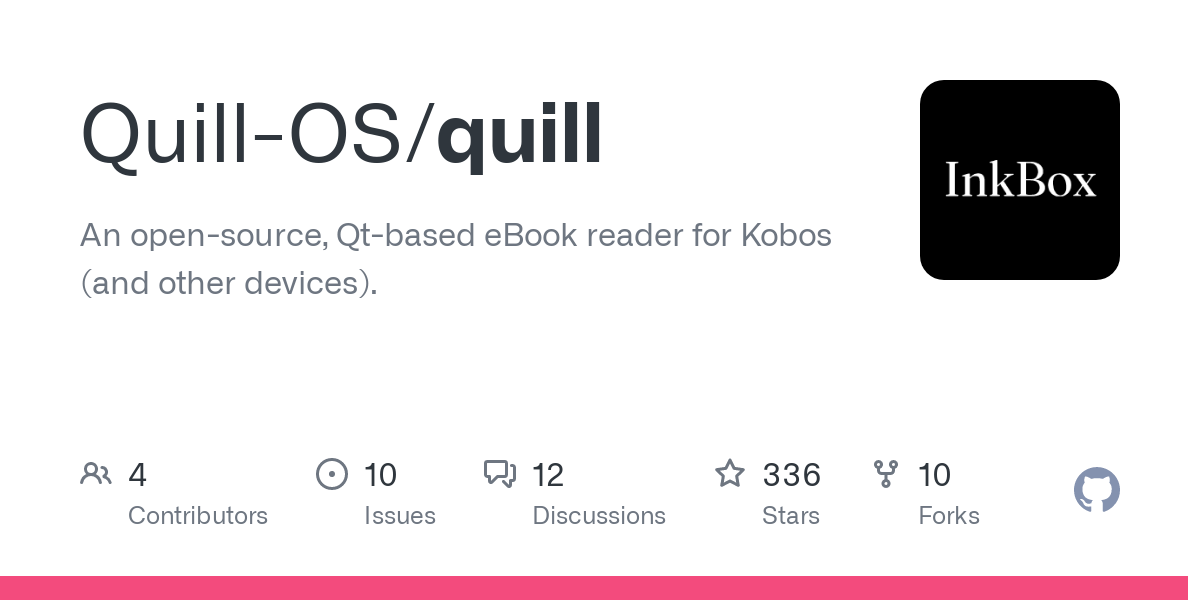wow this is great
This sounds really freaking cool! I was looking for something more in-depth than just koreader launched via nickelmenu. The world of e-ink just doesn’t seem well supported in the custom firmware space. Gonna give this a try on my Glo!
This looks like an awesome project! I have a Kobo Clara HD which I would love to run an open OS on. My priorities would be:
- Being great for reading books, including having a dark mode
- Supporting adjustment of colour temperature of the backlight
- Being able to run syncthing on it. If I could have all the above (and also install CherryTree notes) I would probably throw away my phone!
So the obvious question, how does this compare to KOReader? That’s had a long, stable life and, at first glance, seems to have the same goals. I didn’t see any kind of acknowledgement or comparison in the wiki.
I will add it to the FAQ
This is an OS, not an 3 party app for the stock OS. Why does it exist? ( In my opinion at least):
- It doesn’t reset the whole ereader for no reason, no ads, no forced updates ( The stock OS does )
- It has an app ecosystem, which won’t break after an update. We have many apps, some preinstalled some downloadable: https://github.com/Kobo-InkBox/user-applications
- The system is really hackable, for example: It has xorg ( It’s not super stable but yea ), an alpine rootfs so a package manager. I added USB support to it ( hot pluggable, which is not possible on the stock OS, if at all ): audio, mouse, keyboard: https://github.com/Szybet/niAudio
- I was interested in writing apps for my ereader. It was stupid for me that every app on the stock os ( Koreader, plato, Obenkyobo… ) has to implement their own sleep manager ( A developer in the community, Aramir still has nightmares after it ), wifi etc. Now InkBox and it’s background services manage that.
- It’s stable as hell: There is a recovery mode in which you can export the whole SD card over USB, enable on screen boot logs. The system is immutable which helped me many times.
- Once again, apps: We use musl and glibc so we are not limited by either one ( postmarketOS guys have problems running koreader because musl ). We also provide some ereader friendly libraries, a easy to use Qt toolchain ( I ported many Qt apps, with more or less success. The ones that are an official app are: feathernotes, rssguard, nachat, maps. The ones i gived up on: Marble, Okular )
- We fix things broken on the main OS: At least for my kobo nia I made the touchscreen a kernel module and reset it every sleep / wakeup to prevent a lockup which happened to me on the stock OS. It also sleeps now in and doesn’t wake up, so better battery life in sleep. On every wifi connection it synces time, it drifts a bit.
We have a reader up but it’s not great. A rewrite is ongoing, will finish this year for sure. It won’t be better than koreader for sure, we don’t have 200 developers but it uses Qt, which enables us to use better looking UI than simple menus like Koreader / Plato.
Oh did i mention we have koreader as a user app? you can use it ;)
it also enabled us to do some crazy things: https://youtu.be/hRqquXvsR1Q
Yes, most or many of those things could be done on the stock OS - but no one did it for a simple reason: you want to control things or there will be chaos.
As for now, InkBox is mostly an app launcher for me, but I really like it for it. No more stock OS resets :) For the average user? if you are not interested in those apps, in not hacking your ereader, not doing something unusual with it InkBox is probably not interesting for you. But if you use koreader anyway, dislike the stock OS and like open source, you are welcome.
We are also looking for contributors ( Rust / C++ or anything really ), this project has more potential than it seems
More questions appeared, I will update this message on the wiki: https://github.com/Kobo-InkBox/inkbox/wiki/FAQ


